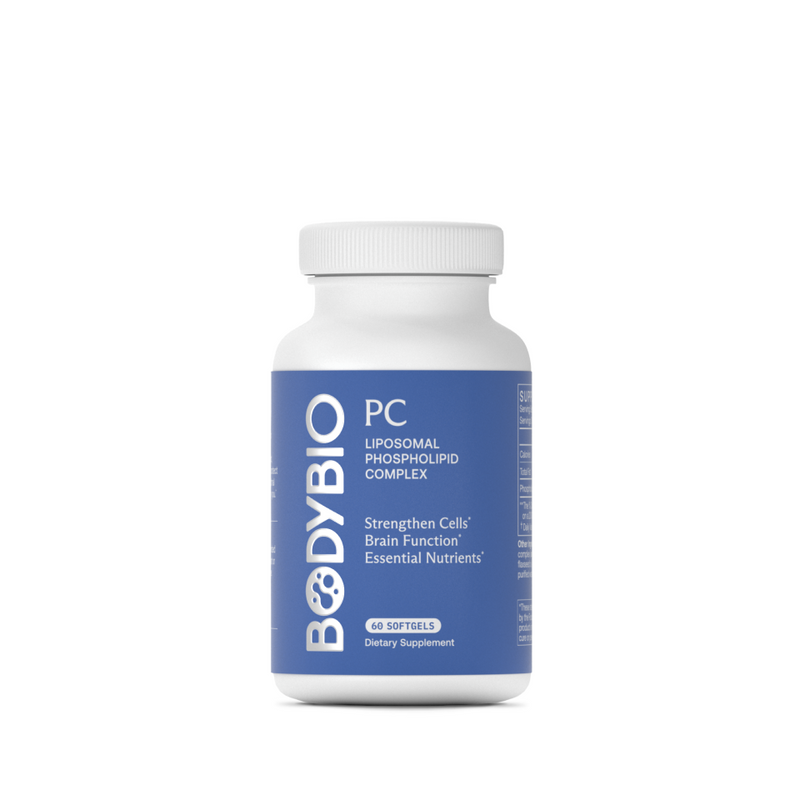The Science of Cellular Stress — and How to Protect Yourself From It
Authors:

Ashley Palmer
Nutritional Therapy Practitioner, Health & Wellness Expert
Key Takeaways:
Stress doesn't just live in your head. It lives in your cells.
Most people understand stress as something psychological — deadlines, relationships, and the mental load of daily life. But chronic stress creates real, measurable damage at the cellular level. It disrupts how your mitochondria produce energy, breaks down the membranes protecting every cell, and overwhelms your body's microscopic built-in repair systems.
This cellular damage can accumulate silently for years before you ever connect the dots between how you feel and what's happening in your cells. So let’s talk about how you can recognize and minimize the effects of cellular stress.
Table of Contents:
-
What Is Cellular Stress?
-
Types of Cellular Stress and Their Causes
-
The Body's Response to Cellular Stress
-
How Chronic Cellular Stress Can Contribute to Disease
-
Ways You Can Reduce Cellular Stress
-
Managing Cellular Stress for Better Health
What Is Cellular Stress?
You're tired. Foggy. Your digestion's been off. It’s stress, right? Just aging. Life being life.
Except there's something else happening that you can't see. Proteins are misfolding inside your cells right now. Your mitochondria are barely keeping up. Cell membranes are losing their integrity. This is cellular stress. And it's quietly shaping your health whether you notice or not.
Cells have strict quality control, proteins need to fold correctly, energy has to flow, and damaged parts get cleared asap. When toxins pile up or nutrients run low, cellular machinery breaks down. Your cells have built-in defense systems for this, but the question is whether you're supporting them or leaving them to fend for themselves. In the long term, this can mean the difference between health and disease.
Types of Cellular Stress and Their Causes
In terms of stress, your cells can't tell the difference between a chaotic work meeting and a processed meal. Emotional stress creates the same cellular response as physical stressors; it all registers as too many demands, not enough capacity. So proteins misfold. Membranes stiffen. Energy drops. You can brush it off in the short term, but left unchecked your health deteriorates at a level you can't see, years before any diagnosis.
Here’s what’s happening on a cellular level to cause ongoing stress and damage.
Oxidative Stress and Free Radical Damage
Every time cells make energy, they create free radicals, unstable molecules that steal electrons from healthy cells. Your body has antioxidants to neutralize them. But there aren’t enough antioxidants to offset free radicals, oxidative stress damages membranes, proteins, and DNA. Studies show this contributes to diabetes, cancer, and cardiovascular disease years before diagnosis.
Mitochondrial Stress and Energy Production
Your mitochondria are tiny power plants generating ATP, the molecule powering everything you do. When you’re stressed, energy production drops. You blame fatigue on poor sleep, brain fog on aging. But research shows mitochondrial efficiency declines with age, which can lay the groundwork for neurodegenerative conditions decades later.
Supporting your mitochondrial health might be the most important thing you can do for your well-being.
Endoplasmic Reticulum Stress and Protein Folding
Inside every cell is a quality control department called the endoplasmic reticulum (ER), making sure proteins fold into shapes they need to function. When proteins don't fold right, they can't work and can become toxic.
When too many misfolded proteins pile up, cells go into emergency mode. Studies show prolonged ER stress triggers inflammation linked to cancer, Alzheimer's, and diabetes.
Metabolic Stress and Nutrient Regulation
When blood sugar swings wildly or cells become insulin-resistant (when cells can't access the fuel they need), metabolic stress disrupts energy storage and use, amplifying oxidative damage.
The Body's Response to Cellular Stress
Your cells aren't defenseless. They evolved sophisticated systems to neutralize threats, repair damage, and restore balance. But here's the problem: chronic stress overwhelms them.
Autophagy and Cellular Repair Mechanisms
Autophagy literally means "self-eating,” and it’s your cells' recycling program. Damaged proteins and worn parts get broken down and reused. Research shows this protects against stress, and other studies show it slows with age, potentially speeding up aging itself.
Apoptosis and the Removal of Damaged Cells
Too-damaged cells activate apoptosis, programmed cell death, allowing orderly disposal without inflammation. Research has shown that this can remove potentially cancerous cells before they cause systemic problems.
How Chronic Cellular Stress Can Contribute to Disease
When your defenses can't keep up, the consequences of long-term stress finally become visible. Being tired turns into chronic fatigue. Forgetting things becomes cognitive decline.
This is when you notice the damage that started years ago.
The Link Between Cellular Stress and Aging
Aging is damage that your cells can't repair. Research demonstrates oxidative stress causes DNA to fragment, which compounds over time. Supporting your cellular health helps you address the quality of life of your cells, not just their longevity.
How Stress Impacts Neurodegenerative Diseases
Neurons need massive energy and accumulate damage over decades, with no way to regenerate. Studies show endoplasmic reticulum (ER) stress contributes to Alzheimer's, with misfolded proteins building up when quality control can't keep pace. This invisible damage builds up years, even decades before symptoms show up.
Cellular Stress and Metabolic Disorders
Diabetes and metabolic syndrome involve profound microscopic stress. Research confirms endoplasmic reticulum (ER) stress creates feedback loops where dysfunction can generate even more stress and further degrade metabolic function over time.
Ways You Can Reduce Cellular Stress
You're not powerless here. There are real, practical ways to support your cells through nutrition, lifestyle, and targeted supplementation. The best defense against age-related disease and decline is a good offense against cellular stressors.
Antioxidants and Their Role in Reducing Oxidative Damage
Antioxidants neutralize free radicals. Research shows vitamin C, E, glutathione, and polyphenols combat oxidative stress.
The best food sources of antioxidants are: berries, leafy greens, nuts, seeds, and colorful vegetables, especially dark colors like purple and blue.
The Impact of Diet and Lifestyle on Cellular Health
Healthy fats matter. Your cells need omega-3 and omega-6 in the right balance (4:1) for strong cell membranes. Essential fatty acids help produce cardiolipin, a key phospholipid that your mitochondria need for energy, and they support your mitochondrial health. Expertly formulated cold-pressed oils like BodyBio Balance Oil give you that perfect EFA ratio.*
Chronic lifestyle stressors create real cellular damage. Whether it's ongoing work pressure, relationship stress, or environmental factors like mold exposure and chemical toxins, your cells experience them all as a sustained threat. Supplements support your defenses, but they can't offset constant exposure to what's overwhelming your system. It’s easier said than done, but you must make lifestyle changes that support your cells if you want to prevent long-term decline.
The Role of Exercise and Sleep in Cellular Recovery
Research connects moderate exercise with optimized autophagy. Walking, yoga, swimming, and movement you enjoy matter most. Meanwhile, sleep is when cells do their deepest maintenance. During sleep, autophagy ramps up, mitochondria recover, and cells clear waste (especially in the brain). Struggle with winding down before bed? When your body has trouble shifting out of high gear, BodyBio Calm may help support your wind-down process.*
Supplements That Support Stress Resilience
Phosphatidylcholine (PC) is the major building block of cell membranes, the protective barrier around every cell. Most PC supplements give you one isolated (and low-quality) ingredient. BodyBio PC is different; it's a complete phospholipid complex supporting both cell membranes AND mitochondrial membranes.*
Managing Cellular Stress for Better Health
Your level of cellular stress determines your health trajectory long before symptoms appear. That fatigue, brain fog, and those digestive issues? They're signals that your cells have been overwhelmed — and it’s time to do something about that.
Your cells are remarkably resilient when you support them properly. Sleep gives them repair time, real food and targeted supplements provide the building blocks they need, setting boundaries protects them from constant assault, and movement activates their recycling systems.
These small, consistent actions compound over time. The work happens at a microscopic, cellular level, but the benefits show up in how you feel, how you age, and how you live.
BodyBio PC is a complete phospholipid complex that supports the cellular membranes your entire body relies on to function.*




